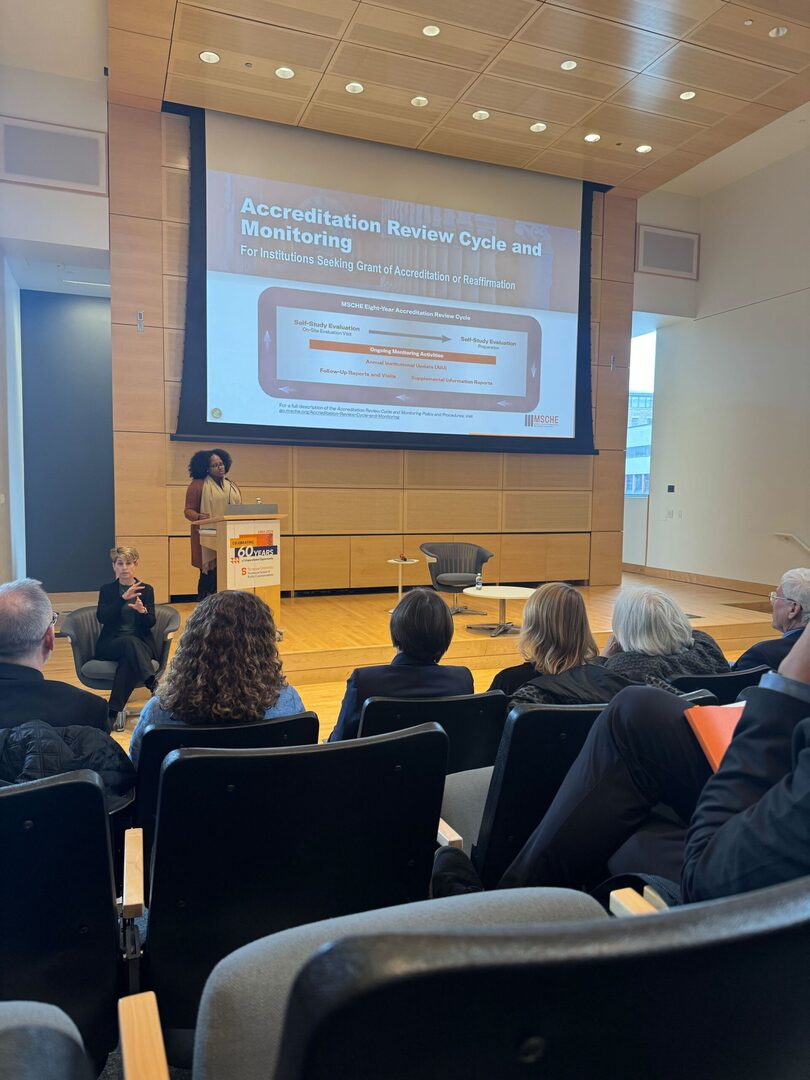SU amid ‘self-study’ period of reaccreditation review process

As SU works toward reaccreditation, students, faculty and administrators gathered to learn more about SU’s accreditation review plan. The university must go through the review process every eight years in order to maintain its credit. Duncan Green | News Editor
Get the latest Syracuse news delivered right to your inbox.
Subscribe to our newsletter here.
As Syracuse University works toward reaccreditation, students, faculty and administrators filled the Joyce Hergenhan auditorium on Thursday to hear Dr. Tiffany Lee from the Middle States Commission of Higher Education outline the process.
Every eight years, higher education institutions are required to go through a review process to maintain their credit from the MSCHE. As accredited institutions, schools must prove their institutional accountability, self-appraisal, improvements and innovations made through dialogue with campus community members, Lee said.
Last accredited in 2017, SU is amid the ‘self-study’ period of the review process, in which university administrators develop a clear plan and self-analysis after dialogue with stakeholders, including students and faculty. This step began last fall and will continue through multiple review phases with representatives of the MSCHE, ultimately leading to a visit and examination by the commission in spring 2027.
That June, the commission will deliver its designation, which can be reaffirmed with follow-up suggestions, or deemed noncompliant with accreditation standards. Noncompliant institutions then have a three-year window to be accredited.
“The majority of our institutions that go through self-study are reaffirmed, whether it’s with reporting or with no reporting in other institutions that are placed in noncompliance status, the majority are reaffirmed within one year,” Lee said. “The commission has a lot of steps and guidance that they offer to institutions that are placed in noncompliance to make sure that there’s a very clear understanding on expectations.”
Jerry Edmonds, SU’s chief of staff for academic affairs, said SU was first accredited by the MSCHE in 1910, and has partnered with the commission every decade since. After the university’s most recent accreditation in 2017, Edmonds said the commission changed its review period to eight-year blocks.
To earn accreditation, SU will also need to satisfy MSCHE’s seven key standards, which include: mission and goals; ethics and integrity; design and delivery of the student learning experience; support of the student experience; educational effectiveness assessment; planning, resources, and institutional improvement; and governance, leadership, and administration.
As the commission reviews these standards, it looks for four types of findings, Lee said. First, it identifies significant accomplishments or exceptional aspects of the institution, before offering advice for areas for continued consideration and review. The commission will then provide recommendations for ongoing compliance and the review board will identify required changes where areas or components of SU’s process fail to comply with the MSCHE’s standards.
To earn reaccreditation, Lee said institutions must also comply with federal regulations. Amid cuts to the United States Department of Education and restrictions to diversity, equity, inclusion and accessibility initiatives on college campuses, the MSCHE is leaving decision-making in these areas to the individual institutions, she said.
“We’ve given our institutions the opportunity to decide how they would like to move forward as the topics and measures mentioned in the executive order, as well as the Dear Colleague letter,” Lee said. “At this time, the commission is not making any changes to our standards or our guiding principles.”
For SU’s self-study period, Lee said she has met with a small review group of administrators and student representatives. After her presentation, Lee met with the group again to provide feedback on the university’s progress.
German Nolivos, SU’s Student Government Association president, is a representative in the review group that’s working with Lee. He emphasized the importance of student perspectives on accreditation and called on undergraduate students to participate.
During future meetings with the MSCHE, Nolivos said SGA will assign members to subcommittees as they work to advocate for the students throughout the self-study process. Lee seconded this, noting accreditation allows students to express concerns about the university.
As he continues to advocate for increased student involvement in university affairs, Nolivos said the concept of self-study allows students and faculty to participate in conversations and decision-making often left to administrators.
“This is an opportunity for the university to process, solve and review their own systems and services that they provide to us as their stakeholders,” Nolivos said. “Sitting at the table is more about staff members, associate deans, people from every area of the university that contribute to university life.”
On its current trajectory, SU is set to renew its accreditation by June 2027.





